中考英语语法考点复习 介词 苏教版
江苏中考英语复习之初三重点语法汇总
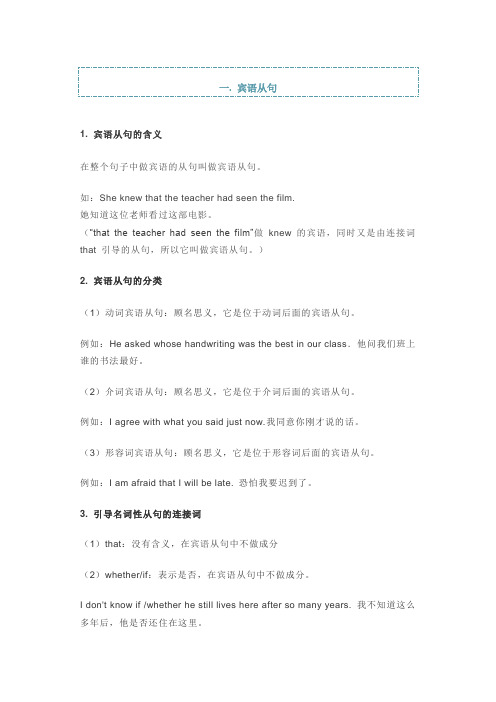
一. 宾语从句1. 宾语从句的含义在整个句子中做宾语的从句叫做宾语从句。
如:She knew that the teacher had seen the film.她知道这位老师看过这部电影。
(“that the teacher had seen the film”做knew 的宾语,同时又是由连接词that 引导的从句,所以它叫做宾语从句。
)2. 宾语从句的分类(1)动词宾语从句:顾名思义,它是位于动词后面的宾语从句。
例如:He asked whose handwriting was the best in our class.他问我们班上谁的书法最好。
(2)介词宾语从句:顾名思义,它是位于介词后面的宾语从句。
例如:I agree with what you said just now.我同意你刚才说的话。
(3)形容词宾语从句:顾名思义,它是位于形容词后面的宾语从句。
例如:I am afraid that I will be late. 恐怕我要迟到了。
3. 引导名词性从句的连接词(1)that:没有含义,在宾语从句中不做成分(2)whether/if:表示是否,在宾语从句中不做成分。
I don't know if /whether he still lives here after so many years. 我不知道这么多年后,他是否还住在这里。
(3)连接代词:what, which, who, whom, whose(在宾语从句中做主、宾、表和定语)连接副词:where, when, how, why(在宾语从句中做状语)The small children don't know what is in their stockings.(what 在宾语从句中做主语)这些小孩子不知道什么在他们的长筒袜里。
Could you tell me why you were late for the meeting this morning?(why 在宾语从句中做原因状语)你能告诉我为什么你今天早上开会迟到吗?4. 在做宾语从句的题目时应注意两点(1)时态①当主句是现在时态时,宾语从句可以根据需要使用任何时态。
初中英语中考语法复习介词知识点

中考英语语法复习介词知识点1.简单介词in on with by for at about under of to at until from before after during above under2.合成介词into within inside outside without throughout3.短语介词according to, because of,in front of,in spite of4.时间介词at、on、in、before、after、during、from、about、by、until5.地点介词in、on、under、at、above、behind、before6.介词用法年月周前要用 in,日子前面却不行。
遇到几号要用"on",上午下午又是"in"要说某日上下午,用 on 换 in 才能行。
午夜黄昏用 at,黎明用它也不错。
at 也在时分前,说"差"用 to,说"过"要用past。
用in:年、月、季节、周、阳光、灯、影、衣、冒(雨)用in;将来时态in表后;小处at,大处in;语言、单位、材料in。
用on:步行、驴、马、玩笑on用at:山脚、门口、在当前,速、温、日落、价、核心用with:具有、工具、和、同随有形with无形by;(with后加工具,工具是有形的;by后加方式,方式是无形的)7.动词+介词常用短语About的短语think about 考虑bring about 导致;引起care about 关心;在意dream about 梦想;梦见hear about 听说hang about 闲逛learn about 了解know about 知道;了解look about 环顾;四处看talk about 谈论;议论worry about 担心write about 编写;写作At的短语arrive at 到达knock at 敲laugh at 嘲笑look at 看point at 指向shout at 朝……大喊smile at 对……微笑throw at 朝……扔Away的短语put away 储存;放好keep sb./sth. away (使)避开;(使)不靠近blow away 吹走,驱散stay away from 与……保持距离;远离give away 赠送get away 逃离move away 搬走go away 离开run away 逃跑,跑掉pass away 去世throw away 扔掉take away 拿走;带走wash away 冲走walk away 起开,离去Back的短语bring back 恢复;使想起;归还give back 归还call(sb.) back 给(某人)回电话go back 回去come back 回来;再度流行pay back 偿还(借款等)get back 回来;返回;回家Down的短语write down 写下;记下take down 拆掉;取下;记下1break down 停止运转;(机器等)出故障turn down 把调低;关小;拒绝calm down 冷静下来cut down 砍倒;缩减die down 减弱;逐渐平息fall down 倒塌;跌倒lie down 躺下pull down 拆除;摧毁put down 放下;记下sit down 坐下slow down (使)减速;(使)放松For的短语search for 搜索;查找thanks for 因……而感激die for 为而死care for 照顾;关怀look for 寻找leave for 动身去pay for 为……付钱stand for 代表prepare for 为……做准备wait for 等待Off的短语burn off 燃烧turn off 关掉cut off 切断;中断break off 突然中止;中断give off 散发;释放get off 下车keep off (使)不接近;远离go off 熄灭;响起put off 推迟;拖延pay off 还清(欠款);成功see off 送行run off 跑掉;逃跑show off 炫耀;显摆set off 动身;启程;使爆炸take off 脱下衣服;(飞机等)起飞shut off 关闭;停止运转On的短语hold on 等一等(别挂电话)pass on 传递keep on 继续(进行)try on 试穿take on 承担;呈现work on 从事;忙于agree on 对意见……一致come on 加油carry on 继续call on 访问;拜访depend on 依靠;依赖;视……而定;取决于decide on 决定;选定get on 上车;进展go on 继续live/feed on 以……为食;靠……谋生put on 穿上;增重;上演turn on 打开Up的短语drive up 开车end up 最终;结束;到头来fill up 装满;填补fix up 修理give up 放弃make up 编造;化妆pick up 接(某人);捡起look up 查阅;查找set up 建立;创立;建造show up 出席;露面take up 开始做;从事;占据stay up 不睡觉;熬夜turn up 调高(音量);出现wake up 睡醒;醒来bring up 养育;提出grow up 成长;长大cheer up 使……振奋;hurry up 赶紧clean up 把(……)打扫干净;put up 张贴;举起;搭建cut up 切碎stand up 站起来dress up 穿上盛装;装扮With的短语deal with 处理;应付play with 和……玩耍agree with 赞同;持相同意见catch up with 赶上(或超过)begin/start with 以……开始come up with 提出;想出(主意、回答等)communicate with 和……交流end up with 以……结束connect with 与……联系talk with 和……交谈part with 放弃;舍弃(尤其不舍得的东西);与……分开get along with 和……相处2。
江苏省苏州市中考英语语法专题练习7《介词》

《介词》1.掌握常见介词的基本用法;2.学会运用由介词构成的短语;3.区分运用易混淆介词。
时间介词( )1. We all like watching the TV program Readers Saturday evening.A in B. on C. at D. for( )2. Over 10,000 runners joined a half and a mini marathons in Xianlin, Nanjing May 7, 2017.A. inB. onC. atD. by( )3. It is reported that heads of the state 29 foreign countries attended the Belt and Road Forum for International一带一路国际合作高峰论坛) May 14 and 15,2017.A in; at B. at; forC. from; onD. of; in( )4. 一When is the Art Festival party?一It's seven o'clock the evening of November 18th.A. at; inB. at; onC. on; inD. in; on( )5. 一I haven't finished the book report of Journey to the West. It's so difficult.一You should hurry up. The report is due three days.A. inB. forC. onD. at( )6. 2000, this company has seen much new development. It has become one of the biggest companies in the country.A. ForB. InC. ByD. Since( )7. Father brought his little boy to a concert. But he was too young to sit the whole concert.A. forB. withC. duringD. through( )8. 一Did you get WeChat red packets(微信红包) the Spring Festival?一Yes. It's actually the most popular way of sending traditional holiday presents now.A. withB. forC. duringD. after方式介词( )1. My son lives a little far from his office, so he always goes to work bus.A. onB. byC. withD. in( )2. How does Jane with her mother? making phone calls or chatting onlineA. keep in touch; WithB. keeping touch; ByC. keep in touch; ByD. keeping touch; With方位介词( )1. A bird flew into the kitchen the window.A. acrossB. aboveC. throughD. under( )2. Nora opened the box. To her surprise, it was a gold watch.A. outsideB. insideC. besideD. behind( )3. 一Why are you unhappy these days, Julie?一I can't see the blackboard because two tall boys sit me.A. behindB. next toC. in front ofD. between( )4. 一Taiwan is an important part of China.一Yes it lies the southeast of China.A in B. on C. to( )5. A woman stood the window, watching the children playing games inthe garden.A. pastB. throughC. acrossD. by( )6. I can't see Lucy because she is the tree.A. in front ofB. behindC. next to其他常见介词( )1. There's one taken by the River Seine these photos. Can you find itout?A. exceptB. includingC. betweenD. among( )2. 一I'm thirsty. I'd like a glass of orange juice. What about you, Dad?一I prefer a cup of coffee nothing in it.A. withB. withoutC. forD. to( )3. 一If someone is your way, what will you do?一I will wait until he or she moves instead of pushing past.A. inB. onC. byD. along( )4. Your gloves should be made leather, for they feel soft and smooth.A. inB. onC. forD. of( )5. Music has become a bridge the East and the West.A. inB. atC. amongD. between( )6. I met Mary, and she lent me ¥20. It was kind her to lend me the money.A. forB. ofC. withD. in( )7. The population of our city has increased 40% compared with of 3 years ago.A. by; thatB. to; thoseC. with; onesD. of; it( )8. Since you are danger, why not ask help?A. in; forB. in; toC. with; forD. with; to( )9. I bought some flowers my mom my best wishes on her birthday.A for; with B. to; forC. of; toD. from; with( )10.一Your best friend is really talented learning foreign languages.一Yes, he is also good other subjects.A in; with B. at; forC. in; atD. at; to( )11. 一Do you have anything else to say for being late again?一No, nothing sorry.A. aboveB. behindC. fromD. but( )12. 一Reading is a good way to spend the time on the plane.一That's true. I never go travelling a bookA. withoutB. fromC. onD. about( )13. 一What do you often do classes to relax yourselves?一We often do some running or listen to music.A. inB. throughC. betweenD. among( )14. 一Can you come to my party this evening?一Sorry, I can't. I have to prepare my exams.A. ofB. forC. aboutD. with( )15. 一Thanks our government, we can play sports on the new playground next week.一That's for sure! And we'll have sports meeting one month.A. for; inB. to; inC. for; afterD. to; after介词短语( )1. Grace often gets nervous before she gives a speech .A. in publicB. in totalC. in common( )2. MissLi, , is active all the time. Although she has not been well these days, her class is still full of laughter.A. As you knowB. start withC. all in all( )3. 一Most of the wild animals are because of their bad living environment.一So we must do something to save them.A. in needB. on dutyC. at workD. in danger( )4. When you're invited to have dinner at home by an American friend, you should be or a little later. It's different from our Chinese custom.A. on timeB. on businessC. on show( )5. 一 , there must be life on other planets though none has been discovered.一I agree with you. The universe is so large after all.A. To my surpriseB. To be honestC. In my opinionD. Again and again( )6. the scientists' hard work, Tiangong II was launched(发射)successfully.A. As forB. Thanks toC. Instead ofD. According to参考答案时间介词1-8 BBCBADDC方式介词1-2 BC方位介词1-6 CBCADB其他常见介词1-10 DAADDBAAAC 11-15 DACBB介词短语1-6 AADACB。
初中英语苏教版知识点总结
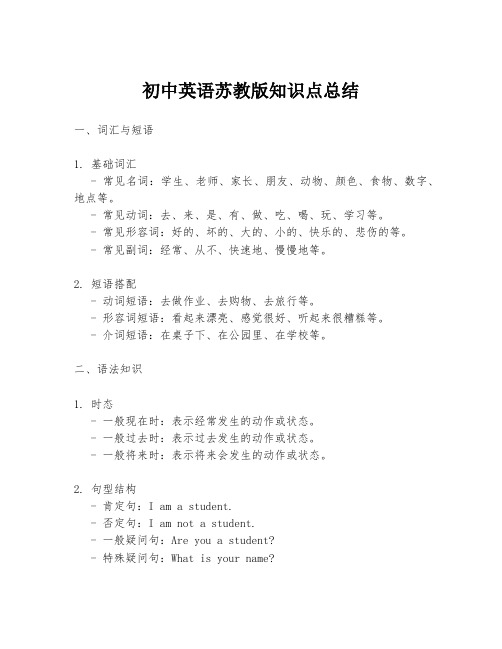
初中英语苏教版知识点总结一、词汇与短语1. 基础词汇- 常见名词:学生、老师、家长、朋友、动物、颜色、食物、数字、地点等。
- 常见动词:去、来、是、有、做、吃、喝、玩、学习等。
- 常见形容词:好的、坏的、大的、小的、快乐的、悲伤的等。
- 常见副词:经常、从不、快速地、慢慢地等。
2. 短语搭配- 动词短语:去做作业、去购物、去旅行等。
- 形容词短语:看起来漂亮、感觉很好、听起来很糟糕等。
- 介词短语:在桌子下、在公园里、在学校等。
二、语法知识1. 时态- 一般现在时:表示经常发生的动作或状态。
- 一般过去时:表示过去发生的动作或状态。
- 一般将来时:表示将来会发生的动作或状态。
2. 句型结构- 肯定句:I am a student.- 否定句:I am not a student.- 一般疑问句:Are you a student?- 特殊疑问句:What is your name?3. 代词- 人称代词:I, you, he, she, it, we, they.- 物主代词:my, your, his, her, its, our, their.- 反身代词:myself, yourself, himself, herself, itself, ourselves, yourselves, themselves.4. 冠词- 不定冠词:a, an.- 定冠词:the.5. 介词- 表示时间:at, on, in.- 表示地点:at, on, in, under, above, behind.- 表示方向:to, towards, through.6. 连词- 并列连词:and, but, or, so.- 从属连词:because, since, although, if, when, while.三、阅读理解1. 文章类型- 记叙文:讲述人物、事件的故事。
- 说明文:解释事物的特性、原因、过程等。
中考英语语法专项复习 介词

中考英语语法专项复习介词介词是一种用来表示词与词,词与句之间的关系的词。
在句中不能单独作句子成分。
介词后面一般有名词代词或相当于名词的其他词类,短语或从句作它的宾语。
介词和它的宾语构成介词词组,在句中作状语,表语,补语或介词宾语。
中考主要考查表示时间的介词、表示方位的介词、表示方式、手段、或工具的介词by,in,on,with 和介词的固定搭配。
对于介词的考察,通常是以单项选择或完形填空形式考查介词用法,尤其是几个易混淆的介词。
另外,介词与动词和形容词构成的固定搭配也是常见的考试内容。
一、表示时间的介词 思维导图记知识点时间介词考点分析知识梳理 表示时间的介词at ,in 与onforbefore 与afterfrombyduring in 表示时间时,用在较长的一段时间on 表示具体某日或某日的上午、下午、晚上后接时间段,表示动作的延续意为“( 时间) 长达……before 表示“在...之前after 与将来时连用表示“....之后表示开始的时间,常与to 构成词组“from...to...表示“到..时候,当( 某时候)到了后接时间段,意为“在..期间二、表示方位的介词 思维导图记知识点介词on 表示一物放在另一物上面, 两者紧贴在一起三、表示方式、手段、或工具的介词by,in,on,with.用by 时,交通工具前不用任何词四.常用介词辨析两个词都有“在...后”之意,behind 只表示位置方面的“在....之后”,不能表示时间,而after则表示时间方面的“在...之后”behind the school 在学校后面after 5 o’clock 5点以后(1)of sb 用于It is +adj+of sb to do sth 句型中,形容词为clever, kind , nice 等描述人物性格特征的词,of 后的人物与形容词有主表关系。
It is very kind of you to help the old man .你帮助那位老人真是太好了。
苏教版九年级上册英语知识点汇总
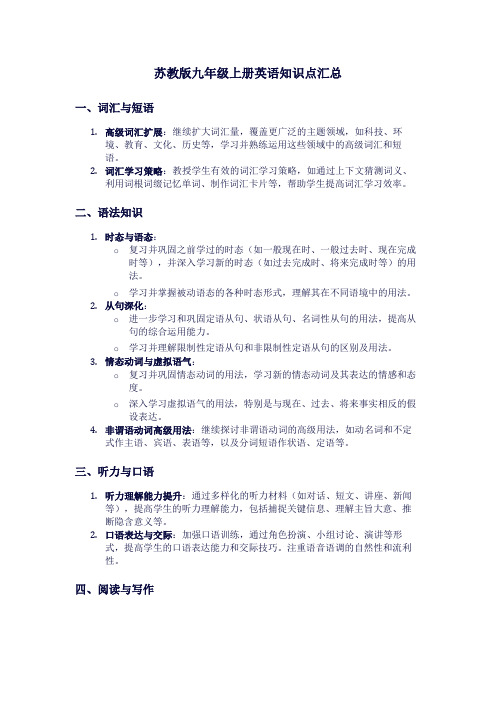
苏教版九年级上册英语知识点汇总一、词汇与短语1.高级词汇扩展:继续扩大词汇量,覆盖更广泛的主题领域,如科技、环境、教育、文化、历史等,学习并熟练运用这些领域中的高级词汇和短语。
2.词汇学习策略:教授学生有效的词汇学习策略,如通过上下文猜测词义、利用词根词缀记忆单词、制作词汇卡片等,帮助学生提高词汇学习效率。
二、语法知识1.时态与语态:o复习并巩固之前学过的时态(如一般现在时、一般过去时、现在完成时等),并深入学习新的时态(如过去完成时、将来完成时等)的用法。
o学习并掌握被动语态的各种时态形式,理解其在不同语境中的用法。
2.从句深化:o进一步学习和巩固定语从句、状语从句、名词性从句的用法,提高从句的综合运用能力。
o学习并理解限制性定语从句和非限制性定语从句的区别及用法。
3.情态动词与虚拟语气:o复习并巩固情态动词的用法,学习新的情态动词及其表达的情感和态度。
o深入学习虚拟语气的用法,特别是与现在、过去、将来事实相反的假设表达。
4.非谓语动词高级用法:继续探讨非谓语动词的高级用法,如动名词和不定式作主语、宾语、表语等,以及分词短语作状语、定语等。
三、听力与口语1.听力理解能力提升:通过多样化的听力材料(如对话、短文、讲座、新闻等),提高学生的听力理解能力,包括捕捉关键信息、理解主旨大意、推断隐含意义等。
2.口语表达与交际:加强口语训练,通过角色扮演、小组讨论、演讲等形式,提高学生的口语表达能力和交际技巧。
注重语音语调的自然性和流利性。
四、阅读与写作1.阅读策略与技巧:教授学生使用有效的阅读策略(如预测、略读、寻读、精读等),提高阅读效率和深度。
引导学生理解文章结构、作者观点、论证方式等。
2.阅读理解能力提升:通过阅读不同体裁和难度的文章(如记叙文、说明文、议论文、应用文等),提高学生的阅读理解能力,包括理解主旨大意、细节信息、推理判断等。
3.写作技巧与结构:学习并掌握不同文体的写作技巧和结构,如议论文的论点、论据、论证过程,说明文的说明方法、顺序等。
苏教版译林初中英语中考语法介词和介词短语精讲课件听课手册

语法互动(五)┃ 介词和介词短语
My mother bought a present___f_o_r____ me. 我妈妈给我买了一份礼物。 We set off__f_o_r____ New York. 我们动身去纽约。 She stayed there ___f_o_r___ a week. 她在那儿待了一周。 Most teenagers live _w_i_t_h____ their parents. 大部分青少年和他们的父母住在一起。 I sat down on the chair _w_i_t_h____ holes in it. 我坐在有孔的椅子上。
晚 上等词前面。 It often rains__i_n______ July. 七月份经常下雨。
(2)on表示在具体的某一天或者某天的上午、下午或晚上等。 She was born__o_n_____ the morning of May 10th. 她出生于5月10日的早晨。
(3)at表示在某个时刻或者某个瞬间。 We left __a_t_____ 2 o'cloc
2.其他含有介词的短语 _s_u_c_h__a_s_ 比如 in_s_t_e_a_d__o_f 代替,而不是 together with和……一起 _th_a_n_k_s__t_o幸亏 look for 寻找 in general 一般而言 because of 因为 at first首先 at least 至少 at once马上 _b_e_g_i_n_/_s_t_a_r_t__w_i_t_h__ 以……开始 depend on/upon依靠 hear of 听说 he_a_r__f_r_o_m_ 收到……的来信 g_e_t__o_n_/_a_l_o_n_g__w_i_t_h_ 与……相处 leave for sp 动身去…… fill…with…用……装满…… look after照顾,照看 l_a_u_g_h__a_t_ 嘲笑 do well in 在……方面做得好
专题04 介词-初中英语重要语法精讲精练(江苏专用)
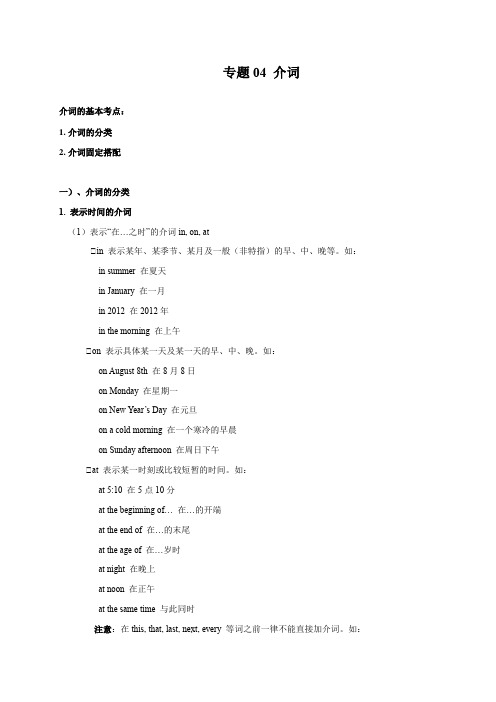
专题04 介词介词的基本考点:1.介词的分类2.介词固定搭配一)、介词的分类1. 表示时间的介词(1)表示“在…之时”的介词in, on, at①in 表示某年、某季节、某月及一般(非特指)的早、中、晚等。
如:in summer 在夏天in January 在一月in 2012 在2012年in the morning 在上午①on 表示具体某一天及某一天的早、中、晚。
如:on August 8th 在8月8日on Monday 在星期一on New Year’s Day 在元旦on a cold morning 在一个寒冷的早晨on Sunday afternoon 在周日下午①at 表示某一时刻或比较短暂的时间。
如:at 5:10 在5点10分at the beginning of… 在…的开端at the end of 在…的末尾at the age of 在…岁时at night 在晚上at noon 在正午at the same time 与此同时注意:在this, that, last, next, every 等词之前一律不能直接加介词。
如:I went to Hangzhou last Sunday.我在上周日去了杭州。
(2)表示“在…之后”的介词after, inafter接时间段,只能用于过去式;接时间点,可以用于将来时。
in 接时间段,用于将来时。
①He came back after three days.三天后他回来了。
①He will come here after four.4点后他要来这里。
①He will come back in a week.他会在一周以后回来。
(3)表示一段时间的介词for, since, by, from… to, until/till①for 表示一段时间。
可以指过去、现在或将来,着重说明“多久(how long)”。
如:My uncle has lived in Washington for more than two years.我的叔叔在华盛顿住了两年多。
江苏中考英语语法专项复习课件:专题(05) 介词和介词短语

I have lived here since 2010.自从 “自……以来”,后接过去的时间点
2010年以来我就一直住在这儿。 since 或时间的分界线,常用于现在完成时,
I have lived here since ten years 谓语动词为延续性动词
o’clock.
我必须在10点前完成所有的工作。
(续表)
词条
用法
举例
“在……之后”,后接时间点, I will go to school after seven o’clock.
常用于将来时
我将在7点之后去上学。
after
后接以过去为起点的时间段, Uncle Tom finished school after three
一般将来时
week. 下周的这个时候我们将在纽约。
(续表)
词条
用法
举例
“直到……”,用于肯定句,表 We must work here until 10 o’clock.
示动作持续到某一时间结束, 我们必须在这儿工作到10点钟。
谓语动词为延续性动词
until not…until…“直到…… The twins didn’t go to bed until 11 o’clock
或晚上
in the morning/afternoon/evening 在上午/下午/晚上
(续表)
词条
用法
举例
“in+一段时间” My father will come back in three days. 我爸爸将在三
表示在一段时间之 天后回来。
in 后,用于将来时,对 —How soon will you finish your homework, Kate?
苏教版中考英语复习各单元要点7B-U1

(牛津初中英语总复习)7B Unit 1一.【精选词汇】㈠重点短语1. would like to live next to a restaurant (p6)〈知识链接〉would like/want sth想要某物,would like/want to do sth想做某事, would like sb to do sth想让某人做某事;注意疑问句Would sb like to do sth? Yes, I’d like/love to.2. homes around the world世界各地的家园(p8)〈知识链接〉around/across/all over/throughout…遍及…,全…⑴全世界:around/across/all over/throughout the world⑵全国:around/across/all over/throughout the country3. look out at the beach and the sea向外看海滩和大海〈知识链接〉look out at…向外看…,look out of…向…外看→ look into…向…里看e.g.①向车外看look out the car ②向外看车look out the car ③向窗里看look the window4. see the sea and the beach from the bedroom windows →see…from…从某处看到某人或某物5. rain a lot=often rain经常下雨〈知识链接〉rain vi.下雨&n.雨水→rainy有雨的e.g. ①It rains a lot.=There is a lot of rain. ②It was rainy last night. ③a heavy rain一场大雨④rain heavily下大雨6. make dinner=cook dinner做饭→ make常指手工制作,cook烹调(p9)7. on the fifth of June=on 5th June=on 5 June=on June 5th=on June 5 在6月5日8. in the cen tre of…在…的中心,在…的中央→in the centre of the city在市中心9. live with my family in a flat on a busy street和我的家人住在一条繁华街道的套房里10. share a bedroom with my sister和我的姐姐合住一个卧室〈知识链接〉share sth with sb和某人分享某物,和某人合用某物11. the best place to grow flowers种花的最好地方动词不定式作后置定语(p10)12. more than多于,超过→less than少于,不到13. on a shelf →on shelves在架子上,on the balcony在阳台上(p13)14. “到达”的三种表达方式:①arrive at+小地方,arrive in+大地方②get to ③reach〈知识链接〉⑴到达这里/那里/家①arrive here/there/home ②gethere/there/home;此时不用reach ⑵到某人的家arrive at sb’s home, get to sb’s home, reach sb’s home ⑶不说到达具体的地方,只能用arrive。
苏教版初三语法重难点整理

苏教版初三语法重难点整理词性标注标点符号:标点符号是标点语调和表示语法关系的符号。
包括:句号“。
”、逗号“,”、问号“?”、感叹号“!”、冒号“:”、引号“‘’”,等等。
代词:代词是用来代替名词的词语。
例如:我、你、他、它、她、我们、你们、他们等。
冠词:冠词是用于名词前的限定词,包括不定冠词“a”、“an”和定冠词“the”。
形容词:形容词是用来描述、修饰名词或代词的词语。
例如:大、小、高、低、美丽、聪明等。
副词:副词是用来修饰动词、形容词、副词和整个句子的词语。
例如:非常、很、快、慢、不等、不常等。
数词:数词是用来表示数量的词语。
例如:一、两、三、十、百、千、万等。
时态和语态时态:时态是指动词所表示的动作或状态发生的时间。
主要有:一般现在时、一般过去时、一般将来时等。
语态:语态是指动词所表达的动作或状态与主语的关系。
主要有:主动语态和被动语态。
主动语态表示主语是动作的执行者,而被动语态表示主语是动作的承受者。
主谓一致主谓一致是指主语和谓语在人称和数上保持一致。
主要有以下几种情况:- 当主语是第三人称单数时,谓语动词要用单数形式。
- 当主语是第三人称复数或第一、第二人称时,谓语动词要用复数形式。
- 当主语是由and连接的两个或两个以上的名词时,谓语动词要用复数形式。
动词时态语态的使用一般现在时:表示经常性或习惯性的动作、状态,或客观真理等。
通常与表示频度的副词连用,例如:always、often、usually等。
一般过去时:表示过去某个时间发生的动作,或过去的习惯等。
一般将来时:表示将来的动作或状态。
被动语态:当我们不知道或不关心动作的执行者时,或者强调动作的承受者时,可以使用被动语态。
倒装句部分倒装:将助动词或情态动词放在句首的句子形式,常用于否定词或表示“只有”“无论”等引导的句子中。
例如:Not only did he study hard, but he also got the highest score in the class.完全倒装:将句子的谓语动词全部提前至主语之前的句子形式,常用于表示祝愿、建议、命令等陈述的句子中。
苏教版中考英语复习各单元要点7A-U1

如:teach→teacher, sing→singer, speak→speaker, wait→waiter, visit→visitor, invent→inventor,act→actor, direct→director (注意:演员和导演都是or结尾)
〈知识链接〉⑴excuse me是美国英语。在美国的公共场所听到最多的,除了“Thanks”、“Thank you.”,就是“Excuse me”(对不起;劳驾;请问)。它用于许多场合,如:开始同陌生人讲话(如问路、问时间),请求让路,从他人身旁走过去,从人群中挤过去,踩了别人的脚,打断别人的谈话,正在谈话过程中要去接电话,请求别人重复刚才说过的话,不同意对方的观点,打喷嚏时,等等。
词汇解析
1.funny滑稽的;好笑的如:①a funny story滑稽的故事②Amy is funny.
fun⑴n.乐趣如:①have fun=enjoy oneself We had a lot of fun at Linda’s party. She is lively and full of fun.②make fun of sb/sth嘲弄;取笑
〈用法拓展〉hard困难的,同义词:difficult,近义词:tough,反义词:easy。
8. play football on/in the football field, play badminton on the badminton court, play basketball on the basketball court, swim in the swimming pool注意上述体育场所及介词的搭配。〈知识链接〉球类运动前不加冠词。
2020年江苏中考英语语法复习——专题五 介词

外一边,横穿”(宿 elephant.让我们过桥去看大象吧。[
across
迁:2014.44)
七(下) Unit 4 P46]
There is a bank across the hotel. 宾馆
满 分
“在……对面”
对面有一家银行。
突 破
through(盐城: “穿过”,强调从某 A river runs through the centre of
分 突
to 其指两地相隔较远,且有湖 度位于中国的西南方。
破
泊、大海等相隔
专题五 介词
返回目录
2. across, through与over(宿迁:2014.44;盐城:2014.27;
淮安:2019.20, 2014.20)
中
考
介词
用法
举例
试 练
“从……一边到另 Let’s go across the bridge and see the
2014.27;淮安: 一空间内部通过或 town. 一条河穿过市中心。
2019.20,2014.20) 穿过
[八(下) Unit 1 P17]
专题五 介词
返回目录
中
考
试
介词
用法
举例
练
They crossed over the river. 他们过河了 “从一边到另一边;穿越”
。
over “遍及”
满
all over the world全世界,全球all over the country全国
分 突
“在……正上方”,表示两者 He held an umbrella over her. 他给她撑
破
不接触
江苏苏州初中九年级英语常用语法知识——介词知识点总结(培优提高)
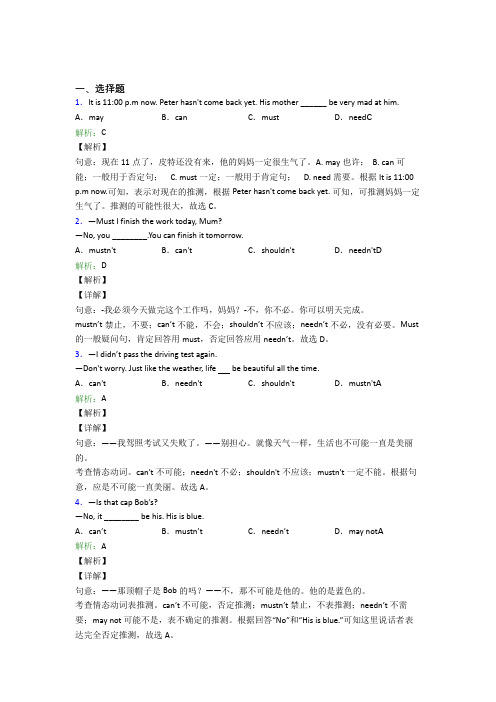
一、选择题1.It is 11:00 p.m now. Peter hasn't come back yet. His mother ______ be very mad at him. A.may B.can C.must D.need C解析:C【解析】句意:现在11点了,皮特还没有来,他的妈妈一定很生气了。
A. may也许; B. can可能;一般用于否定句; C. must一定;一般用于肯定句; D. need需要。
根据It is 11:00 p.m now.可知,表示对现在的推测,根据Peter hasn't come back yet. 可知,可推测妈妈一定生气了。
推测的可能性很大,故选C。
2.—Must I finish the work today, Mum?—No, you ________.You can finish it tomorrow.A.mustn't B.can't C.shouldn't D.needn't D解析:D【解析】【详解】句意:-我必须今天做完这个工作吗,妈妈?-不,你不必。
你可以明天完成。
mustn’t禁止,不要;can’t不能,不会;shouldn’t不应该;needn’t不必,没有必要。
Must 的一般疑问句,肯定回答用must,否定回答应用needn’t。
故选D。
3.―I didn’t pass the driving test again.―Don't worry. Just like the weather, life be beautiful all the time.A.can't B.needn't C.shouldn't D.mustn't A解析:A【解析】【详解】句意:——我驾照考试又失败了。
——别担心。
就像天气一样,生活也不可能一直是美丽的。
苏州市初中英语语法知识—介词的知识点总复习有答案解析

A.againstB.aboveC.throughD.past
24.—Where is Hubei?
--Yes, and please get me some milk. I prefer coffee _________ milk.
A.on B.to C.for D.with
9.Lily often goes to visit her grandma ______ Sundays.
A.at B.in C.on D.to
20.It’s very kind ___________ you to lend me your reusable shopping bags.
A.ofB.forC.toD.with
21.Tom and Black clothes store is ______a great sale. It has nice shirts _______all colors.
A.at; inB.on; atC.of; in
22.They got married_______ 1960. That means they have been married _______ 1960.
A.at; sinceB.on; inC.in; sinceD.for; since
23.—It's wonderful, isn't it?
12.—Why ______ you so busy these days?
—Because they arrived ______ London ______ the morning of July1.
- 1、下载文档前请自行甄别文档内容的完整性,平台不提供额外的编辑、内容补充、找答案等附加服务。
- 2、"仅部分预览"的文档,不可在线预览部分如存在完整性等问题,可反馈申请退款(可完整预览的文档不适用该条件!)。
- 3、如文档侵犯您的权益,请联系客服反馈,我们会尽快为您处理(人工客服工作时间:9:00-18:30)。
透析中考英语语法介词考点【介词命题趋势】1、表示时间的介词2、表示方位和运动方向的介词3、常用介词用法辨析4、介词与其它词类的搭配1)形容词与介词的搭配2)动词与介词的搭配3)名词与介词的搭配【考点诠释】一、考查简单介词的用法【考例】-When did Hong Kong return to our motherland?一____July 1st,1997.[福州市]A.On B In C At D ForA本题的四个选项都可以放在表示时间的单词(组)前面,in,on,at往往在时间点的前面,for往往引导一个时间段。
1997年7月1日是一个具体的时间,在具体到某一天,用介词on。
I'd like a cup of coffee __________some sugar and milk. [广东省]A. inB. toC. ofD. withDA选项介词in,表示“在……里面”;B选项介词to表方向,意为“到,向”;C项of表“所属关系”,意为“……的”;D项介词with作“带有;用_力口”等讲。
由句意“我想要一杯加糖和牛奶的咖啡。
”可知,选项D正确。
--Oh, so many people in the amusement park!-- Nobody likes to stay at home __ Sunday morning. [太原市]A. inB. onC. atB此题考查介词的用法。
三个选择都可以用来表示时间,at多用于具体时间点前,在上、下午及晚上常用介词in,但具体到某一天的上、下午要用介词on。
二、考查介词之间的辨析【考例】The moon light is coming in _________ the window and the room seems quiet and beautiful. [成都市]A, across B. through C. overB across表示横过,从一边到另一边,through从内部穿过,over表示从物体表面通过。
“月光透过窗子射进来……”故不能选A。
Be careful when you come _______ the street, because the traffic is very busy at the moment. (年山东济宁)A. acrossB. behindC. betweenD. over【剖析】答案为A。
本题考察方位介词的用法。
“过马路”一般为表面横穿,因此要用across。
--Look, a blind man is in the middle of the street, It's too dangerous.--Let's go and help him _________the road. [河南省]A. throughB. alongC. acrossD. overC横穿马路要用across表示“从一边到另一边”而不用through,through用于穿过森林等。
三、考查成语介词与介词固定搭配【考例】You must always be careful _________ electricity.It’s dangerous.[沈阳市]A.to B at C for D.withD.be careful with(of/about)…对……注意(警惕),句意为“你必须时刻注意用电,那很危险。
”Boys and girls, wish you to do well in the English exam __ a light heart. Good luck to every-one! [哈尔滨市]A. onB. withC. withoutB考查介词用法。
with a light heart以一种轻松的心态(with表伴随)。
with是中考的重要考点,有如下几种用法:①有,带着②表方式或工具,write with a pen用钢笔书写③表伴随a house with a big garden带有大花园的房子。
Mary bought a house ________a small garden. She will move in next week. [昆明市]A. fromB. withC. forD. ofB本题由句意人手破解,玛丽买了一处“带有”花园的房子,这儿可用介词with,意为“具有;带有”,所以B项正确。
一I hear you have got a ticket ___________the 0pening Ceremony of the Beijing Olympics.一Yes.I got it __________my uncle.[黄冈市]A.of;from B to.by C to;from D.for;toC考查介词的用法。
本题易错选项为A…….的答案/钥匙/票,都要用to,而不能用of。
故不能选A。
It was a great day but We did not enjoy it____ the beginning.[苏州]A.on B.for C.with D.at答案:D解析:此处考查固定短语“在……开始时”,用介词at,故选D。
It is important ____us students to make a plan ____our studies before a new term starts.[·连云港)A.for;for B.of:for C.to;of D.with:on答案:A解析:此题考查介词for的用法,第一空It is important for sb.to do sth.;第二空for our studies为我们的学习,表目的。
It's necessary for us to take one hour's exercise every day. I agree _________you. [吉林省]A. atB. toC. onD. withD agree with sb同意某人的观点。
注意agree with与agree to的区别。
agree with +sb“同意某人的观点”;agree to+动词原形“同意干某事”。
一How are you going to the Summer Palace?一We're going there _____________bike.[北京市]A forB atC of D.byD考查短语by bike"骑自行车”。
要注意区分:take a bike to+某地一go to+某地+by bike。
[ 连云港]This ____woman has devoted all her life____ caring for the poor.A.modest;with B.kind; to C.selfish;for D.unfair;at答案:B解析:第一空意为“这位善良的妇女”,故选kind,第二空,devote…to…指献身于……,to后跟动名词或名词,故本题选B。
【语法回顾】1. 介词的功能介词是一种虚词,用来表示名词或相当于名词的其它词语句中其它词的关系,不能单独使用。
介词可与名词或相当于名词的其它词构成介词短语。
介词短语可在句中作定语,状语,表语和宾语补足语。
例如:The boy over there is John’s brother. 在那儿的那个男孩是约翰的弟弟。
(定语)The girl will be back in two hours. 这位姑娘过两个小时回来。
(状语)Our English teacher is from Australia.我们的英语老师来自澳大利亚。
(表语)Help yourself to some fish. 请吃些鱼。
(宾语补足语)2. 常用介词的用法辨析(1)表时间的介词1)at, in on表示时间点用at。
例如:at six o’clock, at noon, at midnight。
表示在某个世纪,某年,某月,某个季节以及早晨,上午,下午,晚上时,用in。
例如:in the nineteenth century, in 2002, in may, in winter, in the morning, in the afternoon等。
表示具体的某一天和某一天的上午,下午,晚上时,用on。
例如:on Monday, on July 1st, on Sunday morning等。
2)since, after由since和after 引导的词组都可表示从过去某一点开始的时段,但since词组表示的时段一直延续到说话的时刻,因而往往要与现在完成时连用。
而after词组所表示的时段纯系过去,因而要与一般过去时连用。
例如:I haven’t heard from him since last summer.自从去年夏天,我再也没有收到他的信。
After five days the boy came back.五天后,这男孩返回来。
3)in, afterin与将来时态连用时,表示“过多长时间以后”的意思,后面跟表示一段时间的词语。
After与将来时态连用时,后面只能跟表示时间点的词语。
After与过去时态连用时,后面才能跟表示一段时间的词语。
例如:He will be back in two months.他在两个月后回来。
He will arrive after four o’clock四点钟后,他到达。
He returned after a month.一个月后,他回来了。
(2)表示地点的介词at, in, onat一般指小地方;in一般指大地方或某个范围之内;on往往表示“在某个物体的表面”。
例如:He arrived in Shanghai yesterday.他昨他天到达上海。
They arrived at a small village before dark.他们在天黑前到达一个小村庄。
There is a big hole in the wall.墙上有一个大洞。
The teacher put up a picture on the wall.老师把一幅画挂在墙上。
over, above, onover, on和above都可表示“在……上面”,但具体含义不同。
Over表示位置高于某物,在某物的正上方,其反义词是under。
above也表示位置高于某物,但不一定在正上方,其反义词是below。
On指两个物体表面接触,一个在另一的上面。
